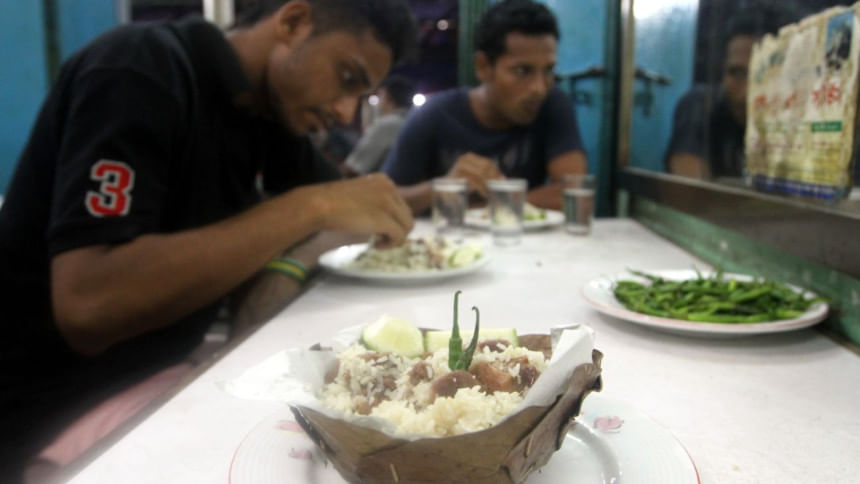The Flavour of Dhaka

It was 76 years ago when Haji Mohammad Hossain opened up a stall in old Dhaka's Nazira Bazaar area – now, 70, Kazi Alauddin Road. His only product to offer was a large dish of biriyani. However, the aroma spread by this dish of biriyani proved irresistible for the gourmet Dhakaites back in 1939.
The legend of Dhaka's Hajir biriyani spread like wildfire throughout the town. Even today, in 2015, flocks of connoisseurs and foodies from all over the country visit the same old place in old Dhaka's Nazira Bazaar area to taste this delicious Hajir Biriyani, named after its legendary maker Haji Mohammad Hossain.
Biriyani has been a part of the Bangladeshi cuisine for a long time. Introduced by the Mughal rulers, Biriyani, originally a Persian cuisine, now has a new taste and flavour thanks to our master-chefs like the Haji. The mystery behind the special aroma and taste of Hajir biriyani is not easy to reveal.

When asked about the secret recipe, Haji Mohammed Shahed, the grandson of Haji Mohammed Hossain answers diplomatically "It's the mercy of the Almighty that makes our food delicious."
However, the master-chef Kalam Miah who got the recipe directly from the pioneer Haji, revealed some of the secrets. Small grains of Kataribhog rice is mixed with mutton pieces from the loin and shank of a castrated goat. These pieces of meat are hand-processed, marinated with mustard oil, and then mixed with secret aromatic spices and condiments. Then, while cooking slowly, the whole dish is covered with a gamcha (a traditional towel) which actually traps the aroma inside the dish.
The original restaurant of Hajir Biriyani has no flashy signboard or fancy menu and interior. Nonetheless, the restaurant is always overcrowded. Many people order for takeaways, which they do at least a few days earlier.
Despite the immense pressure from customers, a limited quantity of biriyani is cooked everyday to ensure its quality. Besides its original outlet, the biriyani is also served in two other branches at Bashundhara and Motijheel in Dhaka.
The dish is cooked in the original outlet and then distributed to the other branches. The takeaway customers receive the biriyani packed inside a unique package made of dried jack-fruit leaves.
Hajir biriyani has become a symbol of Dhaka's rich culture and heritage. But unfortunately, many fake restaurants have been selling biriyanis under the name 'new', 'original' and 'old' Hajir biriyani – which can be a threat to the original and traditional recipe of Hajir biriyani. This traditional cuisine of our country should be preserved not only for the food lovers but also as a relic of our culture and heritage.

 For all latest news, follow The Daily Star's Google News channel.
For all latest news, follow The Daily Star's Google News channel. 



Comments